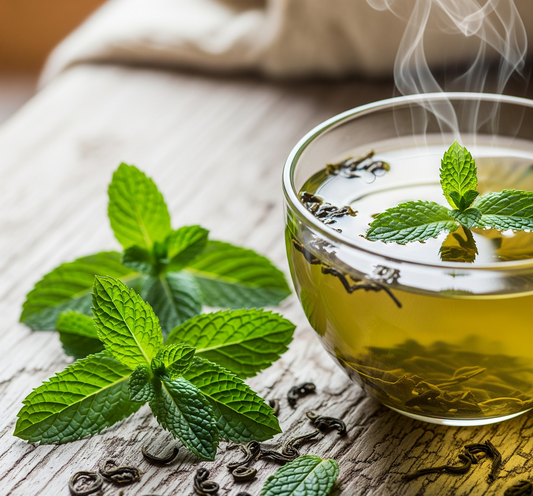Lemongrass, with its tantalizing citrusy aroma, has long been cherished in cuisines around the world. This grassy herb, which you can grow in your own backyard or even on your windowsill, adds a lemony relish to your dishes and offers a range of lemongrass tea benefits.
Read: A Guide Growing and Using Lemongrass: A Refreshing Addition to Your Garden
Many also enjoy lemongrass steeped into a refreshing cup of tea or added into delicious summer mocktails.
For a refreshing lemongrass iced tea recipe to help you beat the heat, you can check out our lemongrass berry ice tea recipe.
But besides its delicious flavors, did you know that this zesty lemongrass tea also benefits your health?
From its antioxidant and anti-inflammatory properties to its digestive support and pain-relieving effects, lemongrass tea is a hidden gem that deserves attention. Research like this one from ResearchGate has also shown that it has a wide range of antioxidant, anti-inflammatory, and anticancer properties.
Furthermore, the same research also mentions that it helps promote healthy digestion, reduces high cholesterol levels, and helps control dandruff.
Join us on a journey as we uncover the fascinating potential of lemongrass for your well-being.
Lemongrass as an Antioxidant Powerhouse:
Lemongrass is a rich source of compounds like citral, luteolin, and chlorogenic acid. These compounds have potent antioxidant properties.
These antioxidants play a crucial role in neutralizing harmful free radicals, which protects your cells against damage. By incorporating lemongrass into your diet, you may help prevent chronic diseases such as heart disease, cancer, and neurodegenerative disorders.
Reduce Inflammation with Lemongrass:
Thanks to its natural anti-inflammatory properties, lemongrass can be a valuable ally in reducing inflammation within your body.
Citral and geranial, found abundantly in lemongrass, contribute to its anti-inflammatory action. Whether you're dealing with arthritis, cardiovascular conditions, or certain cancers linked to chronic inflammation, lemongrass may provide relief and support your overall well-being.
Due to this anti-inflammatory property, lemongrass can also help reduce inflammation on your skin, helping reduce acne and soothe your skin.
Lemongrass Tea Benefits for Digestive Wellness:
Lemongrass can help aid in digestion and help you tackle any gut-health issues. It aids in relieving common digestive issues like bloating, cramps, and indigestion.
How does it work? Lemongrass stimulates the production of digestive enzymes, helps reduce gastric ulcers, and improves gut health. Its antimicrobial properties can even combat harmful bacteria lurking in your digestive tract, promoting a healthier balance.

Lemongrass Tea Benefits for Natural Pain Relief:
If you're seeking relief from muscle pain, joint discomfort, or persistent headaches, lemongrass essential oil may be your go-to solution.
Known for its analgesic and muscle relaxant effects, lemongrass oil is often used in aromatherapy and massage therapy. Simply inhaling its soothing aroma can promote relaxation, reduce stress, and indirectly alleviate pain.
Fight Against Bacterial and Fungal Infections:
Lemongrass possesses remarkable antibacterial and antifungal properties, thanks to its array of bioactive compounds. Studies have shown its effectiveness against bacterial strains like E. coli and S. aureus.
Additionally, lemongrass oil exhibits antifungal activity against. This natural powerhouse can be a valuable addition to your arsenal against infections, complementing conventional treatments.
Lemongrass and Its Potential Cancer-Fighting Abilities:
Early research suggests that lemongrass may have promising anticancer properties. Compounds such as citral have shown inhibitory effects on the growth of cancer cells in laboratory studies.
While more research is needed to understand its full potential in human applications, the preliminary findings open doors for further exploration and hope in the fight against cancer.
Lemongrass Tea Benefits for Managing Diabetes Naturally:
Preliminary evidence indicates that lemongrass may aid in managing diabetes. Extracts derived from lemongrass have shown potential in regulating blood sugar levels, improving insulin resistance, and reducing lipid levels. However, comprehensive research is still underway to establish its efficacy and safety for individuals with diabetes.

Choosing the Right Lemongrass for Your Pantry:
Packed with antioxidants, anti-inflammatory compounds, and numerous other health benefits, lemongrass has rightfully earned its place as a wellness ally. From supporting digestion and alleviating pain to potentially fighting cancer and managing diabetes, this herb showcases an impressive range of therapeutic potential.
Incorporating lemongrass into your lifestyle can be as simple as adding it to your cooking, sipping on lemongrass tea, or enjoying its aroma through essential oils.
However, it's essential to consult with healthcare professionals or registered herbalists before using lemongrass for therapeutic purposes, especially if you have underlying health conditions or are taking medications.
And whatsmore, using inorganic lemongrass that has been exposed to high levels of chemical fertilizers and pesticides can do more harm than good. While choosing your lemongrass, especially if you plan to regularly garnish your dishes with the leaves or add lemongrass to your daily cup of tea, be sure to choose chamber-dried, fresh and completely organic lemongrass.
Frequently Asked Questions:
Is Lemongrass edible?
Yes, unlike the ornamental grass citronella, which can often be confused for lemongrass, lemongrass is edible. Lemongrass leaves can be steeped into tea or added to tea blends or cocktails or mocktails. The stem and bulb part of the lemongrass plant can be peeled, and it’s tender inner parts can be added to your dishes for a zesty, lemony flavor.
What’s the difference between Lemongrass and Citronella?
Citronella plants have wider blades, have a stronger fragrance. Essential oils derived from citronella plants are usually used to repel mosquitos. However, citronella essential oil can act as an irritant for some.
While lemongrass can be used to repel insects, it has a more mellow scent than common citronella grasses. It is also safe to ingest.
Can Lemongrass Tea Benefit My Acne Issue?
Yes. Compounds available in lemongrass have anti-inflammatory properties which can soothe your skin and reduce acne.
Is Lemon grass Toxic to Pets?
Though lemongrass contains compounds that can be mildly toxic to dogs and cats, cases of lemongrass poisoning is rare and can only occur if your pet consumes large amounts of lemongrass. If they have ingested a small amount, it likely won’t cause any harm. However, if you’re concerned, it’s best to contact a veterinarian.
Does Lemongrass Tea Benefit Your Immune System?
Some studies suggest that lemongrass tea might have infection preventing properties. They may reduce the incidence of infection in individuals with weakened immune systems.
Is It Safe to Drink Lemongrass Tea Every day?
Yes, like any other herbal teas, lemongrass tea is safe to drink every day in moderation. However, due to its blood-pressure lowering properties, individuals who already struggle with maintaining blood-pressure levels or pregnant individuals should watch their lemongrass intake.
Is Lemongrass Tea Safe During Pregnancy?
Lemongrass tea can be safe during pregnancy, and lemongrass and ginger blends not only offer a caffeine-free alternative to other teas but can also help soothe nausea. However, intake of lemongrass tea should be moderated during pregnancy. Not only could it cause a lowering of the parent’s blood-pressure, but high levels of lemongrass intake might also hamper the development of your baby.




